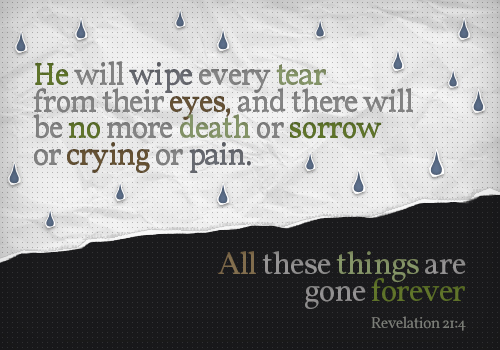Fourth: PERSONAL TESTIMONIAL SERIES, 4-6
… … … … …
Aren’t all these notes the senseless writhings of a man
who won’t accept the fact that there is
nothing we can do with suffering except to suffer it?
Who still thinks there is some device (if only he could find it)
which will make pain not to be pain.
It’s doesn’t really matter whether you grip the arms of the dentist’s chair
or let your hands lie in your lap.
The drill drills on.
~C.S. Lewis, A Grief Observed, p38~
… … … … …
~today we will hear from the hearts of Sara, Abra, Alex~
Ladies, thank you for sharing these glimpses into your lives,
these windows into your hearts as we continue a difficult discussion.
Thank you for giving me personally an opportunity to see how you suffer,
to see where the Lord is working,
to see where my prayers can be directed & my hands may serve.
Thank you for suffering with grace, joy, endurance, and dignity.
Please know that you and your families
are also particularly in my prayers this week.
… … … … …

1. What kind of ministry(ies) does your church have for those who have chronic needs?
Sara~ Ah, I don’t think we have a particular ministry. We regularly organize meals, but usually that’s up to the discretion of the community group. People also fill out prayer request cards that are prayed for during the long prayer, or people post updates/requests on the church’s Facebook page.
Abra~ We are currently in between churches since we moved, so I will answer as though I were still a part of my most recent and beloved church family. It has been relatively easy to access to pastors, mentors and councillors. I have in the past and it was often a blessing.
Alex~ I am fairly new to our church (in the last two years) and I think our church largely meets most needs—or at least relies on the congregation to surface those needs—through “community groups” or small groups. I am unaware of any ongoing official ministry to those with chronic illness or chronic needs; however, that may just mean that it hasn’t been publicized or I haven’t asked for help in the right places.
At my church, community group leaders are responsible for setting up meals for critical needs, like after a baby is born or surgery, but there has never been a formal offering of help to me or a ministry mentioned in my struggle with chronic arthritis. I have had other married women and mothers from my community groups offer childcare to help me a few times, which has been humbling and beautiful, and I have taken them up on it many times. However, I often feel guilty—knowing they have families, jobs, and responsibilities of their own.
2. What kind of specific things would you find personally helpful for your church body to step up for?
Sara~ I’m not sure personally, but I know that my friends with long term health issues tend to struggle with the financial part.
Abra~ In the past, I definitely would have said financial aid with medical bills. During one of my hyperemetic pregnancies, the medication to sustain the pregnancy was costing $100 a week (this was after insurance paid the other $900 a week for it). Since that kind of cash wasn’t in our budget, our church stepped in and offered to cover the expense which made it possible for me to stay home for the duration of my pregnancy instead of being hospitalized. At another church, friends helped set up a regular schedule in which church members helped us with cleaning, childcare and meals while I was on bedrest. It was an incredible gift for my whole family.
During my current struggle with mental health, I would welcome help with my children from time to time. Aside from frequent doctor visits during which babysitting would be appreciated, there are several days when I struggle to have the energy and focus required to be an involved mother for my kids. On those days, I feel horribly guilty for allowing them to watch a lot of tv and would love for them to be able to get out of the house and have some fun!
Alex~ My community group meets weekly, except for set breaks, and they would be responsible for praying for my health, asking about my needs, etc. I cannot quite discern why I feel unsupported by them—this actually culminated recently when I sent out a detailed prayer request to the women of the group, a week prior to my starting the Enbrel treatment—asking desperately for their prayers that the medication would help, and sharing (quite vulnerably) about my physical pain, my fear and anxiety about the pain continuing indefinitely, and my other struggles. I received only a few responses to an email sent to almost 10 women: some responded a week or so later, and some never responded at all. I have cried many tears over this… and spent hours talking to my husband about it… and I do not want to judge them or become bitter in any way. I want God to search my heart to find any way in me that may be self-seeking or self-pitying and for Him to open my eyes to the ways others are suffering and perhaps unable to meet me where I am in my pain.
Childcare would occasionally be a huge help. I don’t have family in the area and I have many, many doctor appointments between my endocrinologist and rheumatologist. I would love childcare for the appointments, or for a date night (I hope that doesn’t sound selfish!), since we use up almost all of our babysitting money for appointments and childcare for our community group. At $10 an hour, it is becoming financially unfeasible to pay for a babysitter.
Due to my specific dietary needs, meals are less helpful. However, cards, encouraging notes or even just an email or text message, a bouquet of flowers—some reminder that they are praying for me—these mean the world to me, and the fact that I haven’t had that support has made me feel so very alone. I believe, in part, it is because my illness is invisible. I’m not in a wheelchair at church services; I am still, Lord willing, able to sing in front of the congregation (even though I need to rest the whole afternoon afterwards), and I don’t have any obvious physical signs of suffering—so I do think that people who don’t know me well, and have only known me for two years period, forget.
House cleaning would also be a humbling, beautiful gift. Especially this past winter, without any family nearby, I felt so very alone and forgotten. My children had many illnesses, we all got a stomach virus, and I got the actual flu. There were afternoons when I was in bed just crying and crying and crying, asking God, “Where is the help? How will I be able to cook dinner for my children?” There were nights when they had slices of bread in front of the television because that is all I was able to manage.
3. What do you wish your church leaders knew about chronic need? In what specific ways would you be particularly blessed by your church leadership?
Sara~ I think our church leaders are pretty in tune with chronic needs as our pastor has chronic health issues. I would say that our church is really good at making sermons available and having live streaming and doing prayer requests. Our church is also really Facebook active so people post prayer requests on there regularly if they want. I feel like there’s a lot of people in our church with health issues so there’s a lot of empathy going on, but people I think feel too overwhelmed to do much more.
Abra~ I do appreciate listening to sermons online several times a week that encourage my spirit and keep me focused on Christ. Personally, I wish church leaders were more able to demonstrate compassionate towards those with illnesses they don’t understand. It can be quite frustrating to see how quickly the church (rightly) responds to physical illness when they seem so hesitant to even acknowledge mental illness. I am, however, thankful to have many friends who pray for and with me even when they can’t relate to what I am going through.
Alex~ My church offers online access to the sermons, which was especially helpful in the winter when I was unable to get to the physical church building.
My desire would be for church leaders to be aware, perhaps, of those in different life-stages who might be willing to help in some way—older mothers who would be willing to watch two additional children, or those who might be able to clean. Most of my contacts in this new hometown of ours are young mothers with children who have very little margin of time to help others.
Thankfully, the Lord has put a grandmother-aged woman from my Bible study in my life as an emotional support to me. She is not a member of my church but another in the area, and she has prayed for me and I see it as the beginning of a mutually beneficial friendship.
I think one of the weaknesses of relying on community groups is that everyone in our particular group is a young mother, busy with their own children. The beauty of my new older friend is that she has many open hours that she would love to devote to prayer, so a ministry of people who love to pray and have space for it already in their hearts, would be wonderful.
When I had acute needs during an extremely high-risk pregnancy, my home church at the time had a prayer ministry pray for my pregnancy, and several members of the congregation sent me cards to encourage my heart. I can’t tell you how much those cards lifted my spirits and quite literally pushed back the darkness and fear I felt—I still have them today. I would love to know that someone was praying for me and would love to receive an encouraging card or note, even though my illness now is chronic rather than acute.
Another thing that would help would be financial assistance. I am crying as I’m writing this, knowing this has been a huge fear and worry for me lately, given the cost of my medication on an ongoing monthly basis. As of right now, I will be on this medication the rest of my life—It is not a short-term course in any way, and it is (to put it lightly) very expensive. I am thankful to God for it and I know He will provide for my needs. He has in the past and He will continue to do so.
The cost of my dairy- and gluten-free diet and the monthly cost of all of my medications in total has been challenging to us. I am not buying any new clothes, we are not going on a vacation we planned…I know these are small sacrifices—VERY SMALL. But any assistance, even a grocery store gift card, would mean the world to me.
Again, I am crying thinking of the gratitude of being seen in that way by the Body of Christ.
4. What do you wish your friends and fellow congregants knew about asking how you are, praying for you, helping with practical needs, etc?
Sara~ Hmmm, not sure. I think letting my community group know my needs would be the first step. Also asking for prayer on Facebook is one of the most common ways of letting the church know about health issues.
Abra~ I am relatively public about my condition but tend to reserve the private details. Unlike having a broken arm or a bad hip, mental illness is more nuanced and tends to invite (often hurtful) skepticism. Unless a friend is heavily involved in my life, someone asking how I am doing can feel overwhelming and intrusive. If I simplify my response, I feel as though I were lying or complaining. Alternatively, to explain would be difficult and time-consuming. I am thankful when my brothers and sisters in Christ remind me that I am in their prayers, without asking for details. I sincerely appreciate it when they offer to help without asking me if I need help. I feel much shame and guilt over my struggles, and talking about it with someone I don’t know very well makes me feel vulnerable and unsafe. All that said, my closest friends and family members check in with me regularly to see how I am doing which is incredibly encouraging.
Alex~ Please ask, and please offer—not generally, but specifically. Instead of asking something general, like, “how are you?” or (my least-favorite question/statement) “are you feeling better?/I hope you’re feeling better”—asking something specific, like “how is your medication working for you lately?” or “has it been a good pain week or bad pain week?” allows me to share God’s victories and also my moments of sadness. It seems that most people simply always want to hear that I’m feeling “better”—but the truth is that a life of chronic illness is really just about ups and downs, good days and bad days, and I would like to share all of that. I would also much rather share about my spiritual health than just the nitty gritty of doctor appointments and medication changes. A wonderful question would be, “how is your relationship with God given all the pain you suffer?” or “how has your illness impacted your faith lately?”
As for offers for help, again I would plead with people to be specific. I have heard from a few people, “you could drop off the kids if you ever need help or need to rest,” but there is little follow up or discussion of when that would work in their schedule. Something as specific as, “I have Tuesday afternoons free, and would love to babysit. Would some Tuesday work for you this month?” would be such a blessing.
Just share what you have, and do what you are able to do. When we all had a rotavirus on top of my arthritis this past winter, and I was desperate, I reached out to a neighbor to ask her to bring me some Pedialyte for the children. She also brought me a candle, some flowers, and a few roll-on bottles of essential oils. She didn’t ask me if I “needed” those things; she just generously brought them, knowing they would lighten my load and bring beauty into my sadness. Months later, I am still thanking God for her and for that gift.
Being able to write about this is a blessing in itself, because I think one of my greatest emotional pains in this whole journey is how alone I have felt, and in particular, how unsupported I have felt both from my community group (a couples’ small group) and from the church at large. It honestly is not from lack of sharing about my disease—which I talk about almost weekly—or accepting help when people offer. I have wrestled a lot internally and with God on this issue—is it the invisible nature of my illness, is it that I am still striving so hard to “look perfect” when I go out or have people over that they think I couldn’t possibly need any assistance…? I often ask myself, do I need to be more honest? Do I need to ask for things specifically? I am searching my heart on these issues, but I am in tears just thinking about how more support from my church would lift both my physical burdens and my spirits.

Suffering is nothing by itself.
But suffering shared with the passion of Christ
is a wonderful gift,
the most beautiful gift,
a token of love.
~Mother Theresa~
… … … … …
~next time, in our fifth focused entry in the discussion of serving those in our churches with chronic suffering (chronic physical illness, chronic mental illness, chronic pain, and so many other various manifestations of suffering…), we will hear from a large smattering of church members from all types of varied church bodies… some of the input will be from the perspective of those who are suffering, some of the input will be from those who are serving the suffering, and of course sometimes that overlaps… so stay tuned, and be prepared to comment as a way of joining the conversation~
… … … … …
In the meantime, let us continue in our prayers
for the Lord to be at work in our own hearts
and in our own churches.
Pray for your own eyes to be opened to the suffering around you
so that your prayers can be tuned specifically,
your hands can labor to bless others,
your family can find unique ways to come alongside those in your church
who would be blessed by whatever gifts you have been equipped to share.
Pray for your own heart to be softened, also,
if you are suffering in any way.
Pray that you would have immense grace in your heart
toward those around you,
both those who are obviously serving you
and those who you don’t feel or see reaching out.
Pray that each of us would be open to the leading of Christ
in whatever way we particularly need grown, strengthened, challenged~
so that our spirits would be nourished,
our anxieties would be put to rest,
our burdens would be lifted,
our bodies resigned to where the Lord has called us.
May Christ be glorified in us and through us.
Amen.
… … … … …
There is a purpose of suffering,
and if faced rightly it can drive us like a nail
deep into the love of God
and into more stability and spiritual power than you can imagine.
~Timothy Keller~
… … … … …
~part of our series, Serving Those in The Church with Chronic Needs~
… … … … …




















